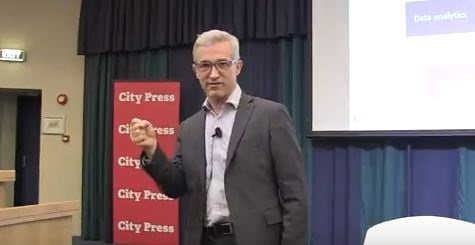
Technology, automation and shifting demographics all have far-reaching implications for employee communications and engagement as organisations are faced with growing pressure to change the way they operate.
Leslie Benson, senior managing director in the strategic communications segment at FTI Consulting in London told a Gibs Forum that three interconnected global trends are challenging the way companies communicate: The digitisation of communications, employee influencers and customer centricity.
These trends alter how organisations effectively mobilise, engage and enable staff in times of strategic, environmental and demographic change.
The digitisation of communications
Amid the growing dominance of digital communications tools in organisations, challenges around their effective use, governance and measurement are common.
“In a world of digital communications, human skills are becoming ever more important,” Benson explained.
Communications in a digital environment must be reshaped to enable both top-down and bottom-up collaboration, creating a sense of dialogue.
As communications tools shift to digital means, concerns have arisen around how to innovative collaboratively and effectively across functions; levels and means of control; issues of governance; data management and mechanisms to measure efforts in a sustainable fashion.
Benson said the move in organisational demographics towards a younger generation as millennials enter the workplace in ever increasing numbers means communications have become flatter and more democratised, and require both technical and human skills.
“There is an increased pressure on people to multitask as email and digitisation have increased expectations around what people can do effectively.” This requires a combination of verbal, written and digital skills.
Working in teams has faced the most disruption in the digital environment, Benson said, with the introduction of virtual teams.
“Building relationships and working effectively in virtual teams requires action-centred leadership. Managing teams, individuals and tasks has become more fluid in the digital world and people have to be more agile.”
Employee influencers
“Identifying and engaging individuals in the organisation who are genuinely passionate about the company and communicate that passion using social media can help promote a sense of authentic engagement and community,” Benson said.
These individuals can promote compelling, peer-to-peer advocacy and engagement.
“What are the stories on the ground and how do you deliver content to people? This is less about control of the message and more about influence,” Benson said.
Developing employee influencers involves recruiting connected individuals and identifying the networks they use to communicate with colleagues and customers, enabling them to become ambassadors for the organisation.
“The growing impact of employee ambassadors forces organisations to look more carefully at the informal connections that may exist and ask who their most effective communicators are.”
However, this does bring with it challenges around the governance of informal communications and message alignment.
The trend of employee influencers is connected to the increased demand for transparent communication, often driven by the younger generation.
Leaders in a digital environment need to consider the millennial expectation for authority to be more accessible.
“Demands on employers are greater than ever before as employees are interested in working for transparent, purpose-driven organisations and tend to resist employment in environments that don’t create authentic engagement.”
Renewed focus on customer centricity
Reshaping employee attitudes to optimise customer centricity is receiving renewed attention, as customer experience is expected to overtake price and product as the key brand differentiator by 2020.
Customer centricity can drive customer loyalty, retention and engagement, and ultimately impact on a brand’s equity, Benson said.
Fostering an environment that encourages customer centricity will ultimately have financial and commercial benefits.
The move is also related to changing demographics, increased digitisation and widespread use of social media, which have had far-reaching consequences for customer engagement.
Creating a holistic experience for customers requires employee alignment across the organisation, creating positive viral opportunities to celebrate good experiences on social platforms. Benson used the example of an airline trip, where a customer’s experience begins curbside with their baggage check-in and only ends once they have reached their final destination. The entire experience can be categorised as a hospitality opportunity, rather than a transportation service and requires alignment and communication across various functions and locations.
In order to change an organisation’s focus towards customer experience, companies must help employees to see the world through the lens of the customer, facilitating their understanding and empathy. Reshaping experience for customers means changing the way customer facing people think, feel and behave, and defining what a “good” customer experience looks like, and what excellence is.
“Leadership, together with the communications and human resources functions can act as a powerful mechanism for change in an organisation,” Benson concluded.
• City Press is a media partner for the Gibs forums.




 Publications
Publications
 Partners
Partners








